When it comes time to purchase supplies and equipment, owners of electroplating, anodizing, liquid, and powder coating shops say the more the merrier.
As in having suppliers to choose from.
The past decade has witnessed numerous consolidations, mergers, and acquisitions among suppliers that provide finishing and coating companies with the necessary chemicals, equipment, and other essential items required daily.
The changes have left a sour taste in the mouths of many shop owners and managers, many of whom sounded off when www.FinishingAndCoating.com surveyed shop owners several months ago on what they saw as a concerning trend in the industry.
“Customer service in the finishing industry shouldn’t just be about answering phones,” says Ty Crowder, President of Total Finishing Solutions.
“There is too much consolidation of chemical companies,” says one shop owner, who asked to remain anonymous. “There used to be a lot of companies we could choose from, but those days are over. We have the people we have who can supply us, and that isn’t good.”
“Consolidation of suppliers is a big issue that should concern all of us,” says a Midwest finisher who offers both electroplating and liquid coatings. “When you have fewer people to choose from, they always seem to have the upper hand. You pay what they are telling you you are going to pay.”
Bemoaning the Reduction of Services
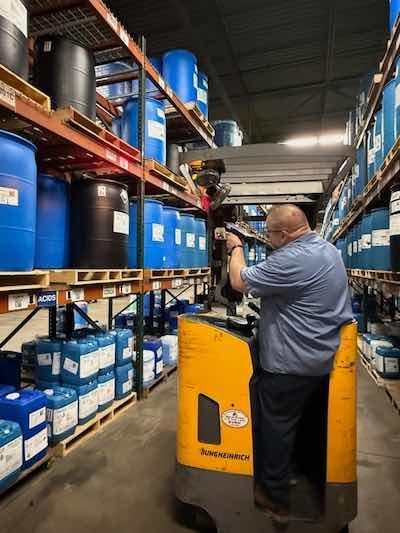 Hubbard-Hall is introducing AI-based tools for troubleshooting and product selection to help expedite orders.Even worse, some finishers and coaters bemoaned the lack of service that often follows when consolidations, mergers, and acquisitions take place. Some companies have reduced their staffing, and others have begun to charge customers for services that were once available to them, such as lab work.
Hubbard-Hall is introducing AI-based tools for troubleshooting and product selection to help expedite orders.Even worse, some finishers and coaters bemoaned the lack of service that often follows when consolidations, mergers, and acquisitions take place. Some companies have reduced their staffing, and others have begun to charge customers for services that were once available to them, such as lab work.
“No matter which chemical or specialty plating chemistry supplier we use, the overall level of technical support seems to be diminishing,” says a large East Coast finisher. “Far too many technical reps who have been around for years are retiring, and no one is filling their roles. So, the traditional technical assistance and support level in our supply chain is trending in the wrong direction.”
Some industry suppliers have recognized the frustration among shop owners and have taken steps to improve their customer service to attract new customers.
“Customer service in the finishing industry shouldn’t just be about answering phones,” says Ty Crowder, President of Total Finishing Solutions, which offers finishing systems, robotics, flatlines, and spray booths for both liquid paint and powder coating.
“It should be about showing up, solving problems, and elevating the entire operation,” he says. “We don’t have customers, we have partners. We’re not in this to push products — we’re here to make people money, make their lives easier, and make it fun while we do it.”
 Scott PapstScott Papst, Senior Vice President of Sales and Business Development at Hubbard-Hall, says it is easy to blame consolidation for many of the issues finishers are facing with service from their suppliers, but notes that there are other issues as well.
Scott PapstScott Papst, Senior Vice President of Sales and Business Development at Hubbard-Hall, says it is easy to blame consolidation for many of the issues finishers are facing with service from their suppliers, but notes that there are other issues as well.
“It’s easy to blame consolidation—and that’s part of it—but the bigger truth is the market’s changed,” he says. “Customers are buying less chemistry, the regulatory load is heavier, and there are fewer shops overall. You can’t keep sending experienced reps to do weekly tank checks when the volume doesn’t support it financially. A lot of what customers miss was always unofficial. The service was free, but it was never priced. And now that it’s gone, they feel the gap. I get it. But the model has to evolve.”
Papst says that in the past, shops didn’t recognize the valuable services they were getting from suppliers.
“When it came time to negotiate, price was the only filter,” he says. “Everyone wants the Cadillac support package, but at a Kia price. We’d offer chemistry plus technical support, but customers rarely differentiated between a partner and a price sheet. Now that some suppliers have cut back or walked away, they’re seeing what they lost—but they weren’t willing to pay for it then.”
“We track every lab sample sent for analysis from the time it comes in to when it goes out,” Larick says. “48 hours is our benchmark to provide shops with analysis promptly so it can be actionable.”
 Brad MajoyBrad Majoy, Vice President of North American Marketing for Pavco, says his company recognizes the critical challenges many shops face in maintaining a full workforce and accessing consistent technical support.
Brad MajoyBrad Majoy, Vice President of North American Marketing for Pavco, says his company recognizes the critical challenges many shops face in maintaining a full workforce and accessing consistent technical support.
“That’s why we've made a significant, strategic investment in acquiring and developing young talent,” says Majoy, whose company has been a developer and supplier of chemistries for the metal finishing industry since 1948. “By actively recruiting skilled apprentices, recent graduates, and emerging professionals, we're not only helping to bridge the workforce gap but also injecting fresh energy and innovative thinking into the industry.”
He adds that the investment Pavco has made in its corporate headquarters and pilot facility has provided an ideal training environment for their staff and customers to be trained in the latest technologies and processes.
“It allows us to provide immediate, hands-on support to shops that need it most,” Majoy says. “Through mentorship programs, ongoing technical training, and on-the-ground assistance, we ensure that our talent pool is equipped to deliver real, impactful help where it’s needed.”
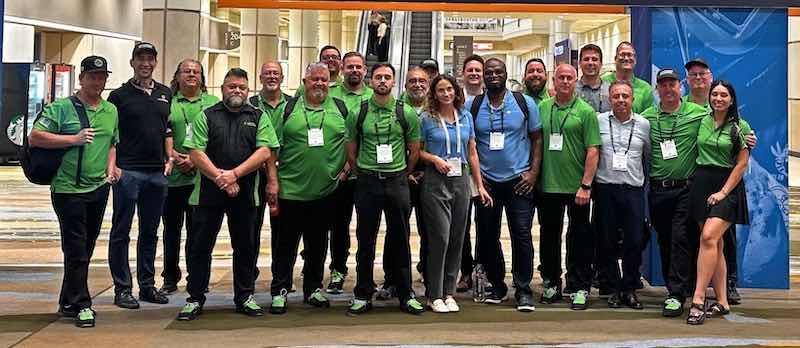 Total Finishing Solutions' President Ty Crowder says they have been adding sales reps to help with customer orders and service questions.
Total Finishing Solutions' President Ty Crowder says they have been adding sales reps to help with customer orders and service questions.
Service as a Defined Core Value
 Brett LarickAt Columbia Chemical, President Brett Larick says that service is one of its defined core values, but it also translates to metrics they track, such as turnaround time in their lab.
Brett LarickAt Columbia Chemical, President Brett Larick says that service is one of its defined core values, but it also translates to metrics they track, such as turnaround time in their lab.
“We track every lab sample sent for analysis from the time it comes in to when it goes out,” Larick says. “48 hours is our benchmark to provide shops with analysis promptly so it can be actionable.”
Columbia Chemical’s order processing and shipping turnaround is also a key metric they track every week.
“We log from the time the order comes in and track it to ensure we get it out within three days, and most of the time it ships out within two,” says Larick, whose company develops surface finishing additives and is 100% employee-owned.
He says having employees who are vested in the company makes it easier to service customers.
“From a technical support standpoint, we are fortunate to have a lengthy tenure at Columbia, which provides a depth of technical expertise that is readily accessible to customers,” Larick says. “We have also made a conscious effort to train and promote internally. Within our quality control and service lab, we hire highly qualified chemists with advanced degrees, and we utilize that lab as a training ground for future professional growth. In the past, we have had people move into R&D, sales, and technical field service. This allows us to offer a sustained level of technical expertise to the industry.”
 Ted VentrescaTed Ventresca, President and COO of Chemeon Surface Technology, says his company recognizes that the loss of specialized knowledge in metal finishing, surface treatment shops, MROs, and OEMs has created a profound void in talent and experience, as well as in line processing and troubleshooting.
Ted VentrescaTed Ventresca, President and COO of Chemeon Surface Technology, says his company recognizes that the loss of specialized knowledge in metal finishing, surface treatment shops, MROs, and OEMs has created a profound void in talent and experience, as well as in line processing and troubleshooting.
Doubling down on its customer service programs has helped drive new customers to Chemeon, while other companies have reduced their support to the finishing industry.
“Our customers know they are a phone call away from technical support from Chemeon scientists and engineers who are known as subject matter experts in anodizing and conversion coating,” Ventresca says.
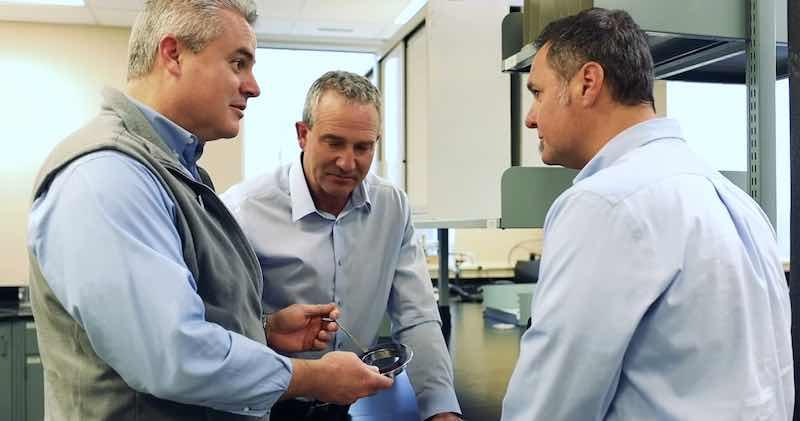 From left, Columbia Chemical President Brett Larick, Chief Technology Officer Mark Schario, and Director of Business Development Jeff Boehmer say they track lab samples sent for analysis to ensure it gets back to a customer in about 48 hours.
From left, Columbia Chemical President Brett Larick, Chief Technology Officer Mark Schario, and Director of Business Development Jeff Boehmer say they track lab samples sent for analysis to ensure it gets back to a customer in about 48 hours.
Adding More Hands-On Training
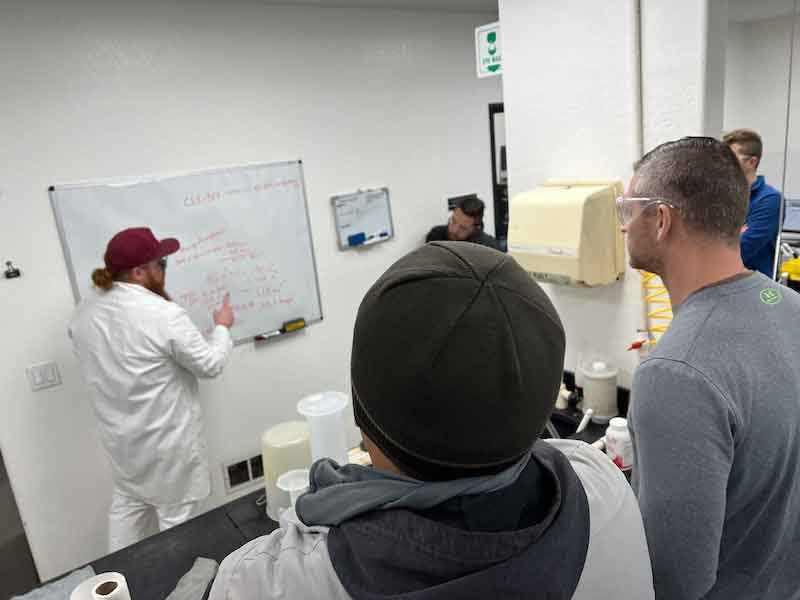 Chemeon has added more training classes for its customers at their Nevada headquarters.And it isn’t just direct customer service; Chemeon has added more hands-on training for its customers. Suppose OEMs in automotive, consumer electronics, DoD, and aerospace — as well as finishing shops and MROs — need to fast-track process and troubleshooting knowledge. In that case, Ventresca says Chemeon’s exclusive university-level training in anodizing and trivalent chrome conversion coating teaches best practices in processing and troubleshooting.
Chemeon has added more training classes for its customers at their Nevada headquarters.And it isn’t just direct customer service; Chemeon has added more hands-on training for its customers. Suppose OEMs in automotive, consumer electronics, DoD, and aerospace — as well as finishing shops and MROs — need to fast-track process and troubleshooting knowledge. In that case, Ventresca says Chemeon’s exclusive university-level training in anodizing and trivalent chrome conversion coating teaches best practices in processing and troubleshooting.
“This can reduce part failures, costly reworking of parts, while increasing consistent QC, and positive OEM/DoD audits,” he says. “Investing in new talent through training also factors into employee retention and satisfaction. Our training is a great way for companies to bring new team members up to speed and adapt during a period when seasoned guidance they once depended on may have left their facility.”
Papst says Hubbard-Hall made a deliberate decision not to hollow out its support team, but that they have had to be smarter by adding more services.
“For example, we’re introducing AI-based tools for troubleshooting and product selection—stuff that helps finishers get answers fast without needing a rep onsite,” he says. “We’re also exploring remote monitoring—IoT sensors that tell us bath condition, pH, temp, etc., so we can flag issues early. We’ve shifted to a tiered model: senior representatives focus on selling and high-impact problem-solving, while junior technicians and inside support handle routine visits. It’s scalable and responsive.”
Ventresca says when a customer is told by a supplier that they can only purchase in drums, totes, or a rail car of a product — when they have historically only needed 20 gallons of a cleaner, or 10 pounds of a dye — that can affect a business relationship and trust.
 Anthony MilesAnthony Miles, President of Miles Chemical, a distributor of chemistries and equipment based in Southern California, says that it seems proprietary chemical producers’ support has always been a challenge on the West Coast, particularly in California.
Anthony MilesAnthony Miles, President of Miles Chemical, a distributor of chemistries and equipment based in Southern California, says that it seems proprietary chemical producers’ support has always been a challenge on the West Coast, particularly in California.
“We feel, in part, because of their operations on the east coast and Midwest, less concentrated end user location, freight issues, especially when weather-related, and the regulatory environment,” Miles says. “It has been further exacerbated by overall consolidation, relocation from both the suppliers and end users.”
For his company, Miles says in many respects, nothing has changed for them. Their model has been built around having Miles industry-oriented account managers, technical service representatives, a customer service lab, and strong supplier support.
“It has shown to be a benefit for all,” he says. “That is not to say there aren’t challenges ahead. Everyone is doing more with less. It is not only due to end-user/supplier consolidation but also staffing levels. It is compounded by having less of an available talent pool.”
 Ty CrowderCrowder says he instills in each staff member the importance of serving customers, and notes that one of Total Finishing Solutions’ foundations is straightforward: service is king.
Ty CrowderCrowder says he instills in each staff member the importance of serving customers, and notes that one of Total Finishing Solutions’ foundations is straightforward: service is king.
“We don’t just sell equipment,” he says. “We invest in our customers’ success by educating their teams, optimizing their workflows, and backing every install with decades of hard-won expertise. Support isn’t a department here; it’s the culture.”
Crowder says his team is trained and has embraced going the extra mile when its competitors sometimes neglect he little things to make a customer happy.
“Whether it’s overnighting parts, staying an extra day to get the install just right, or making sure that air hose is the perfect shade of green, we’re going to ‘TFS it,’” he says. “That’s our promise, and that’s what sets us apart. Service isn’t just a pillar for us. It’s the foundation.”
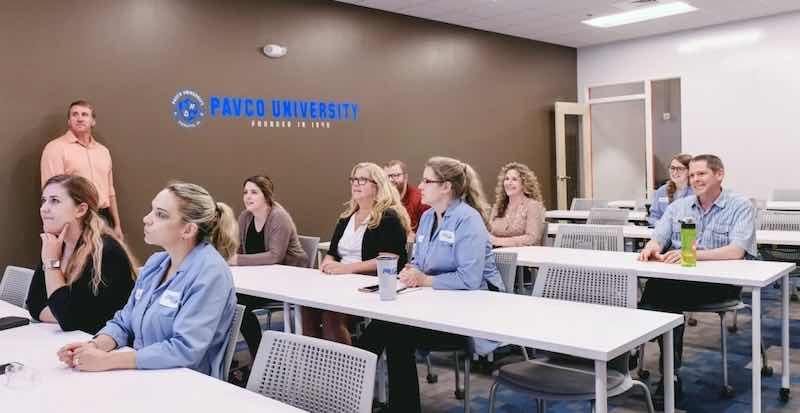 Pavco has increased technical service, research, and instrumentation laboratory capacity by over three times its previous size, and over seven times for its Pilot Technology Center.
Pavco has increased technical service, research, and instrumentation laboratory capacity by over three times its previous size, and over seven times for its Pilot Technology Center.
Looking Forward to Healthy Competition
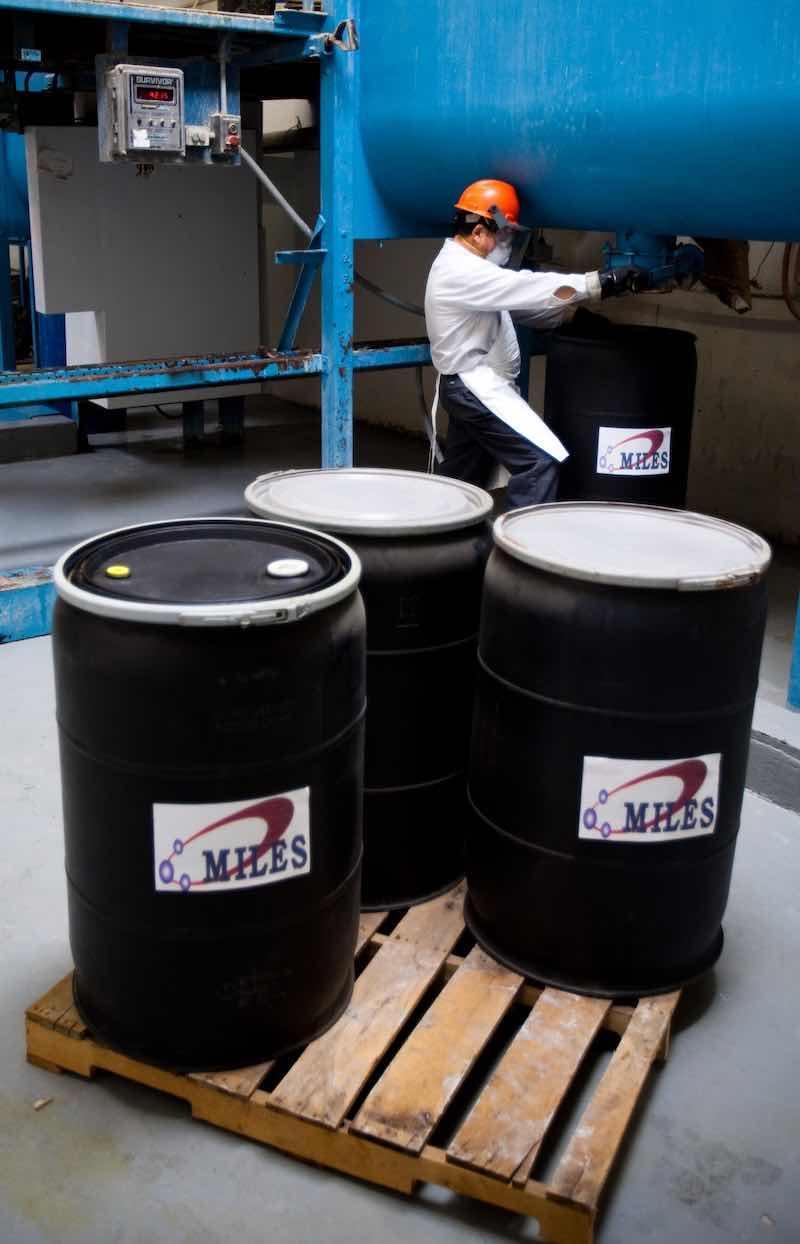 Miles Chemical says their business model is built around having industry oriented account managers, technical service representatives, a customer service lab, and strong supplier support.Going forward, many suppliers say they look forward to healthy competition among other suppliers, as well as the opportunity to win over some customers who aren’t satisfied with the service or pricing they are currently receiving from their suppliers.
Miles Chemical says their business model is built around having industry oriented account managers, technical service representatives, a customer service lab, and strong supplier support.Going forward, many suppliers say they look forward to healthy competition among other suppliers, as well as the opportunity to win over some customers who aren’t satisfied with the service or pricing they are currently receiving from their suppliers.
“The silver — or aluminum — lining issues that may occur with chemical supplier consolidation allows independent chemical company’s like Chemeon — who already have unique MIL-DTL qualified differentiators, and a customer focus reputation — to help shops, OEMs, and MROs in the U.S. and abroad get the service, technical support, and chemistry they need in quantities they can use,” Ventresca says.
He says when an OEM or shop is told by a consolidated chemical supplier that they can only purchase in drums, totes, or a rail car of a product — when they have historically only needed 20 gallons of a cleaner, or 10 pounds of a dye — that can affect a business relationship and trust.
“In contrast, human interaction, training programs, and expert technical support, that, in our case, can connect an OEM or shop directly to the inventors of our MIL-SPEC chemistries, are differentiators that will always resonate with customers,” he says.
Pavco’s Majoy says consolidation has played a key role in reshaping the supplier side of the finishing industry. He says Pavco has grown strategically throughout this consolidation, and they have been able to streamline operations, expand their capabilities, and offer a broader, more consistent range of products and services under one roof.
“Teaming with our distribution partners, we have been able to eliminate juggling multiple suppliers,” he says. “Shops can work with a single, trusted partner who understands their challenges, brings deep industry expertise, and is equipped to support them at every step—from product supply to technical troubleshooting and process optimization.”
“I would agree that in past years, the industry has experienced a technical brain drain, but I am seeing a light at the end of the tunnel,” Larick says.
Majoy says for shops, this means greater reliability, improved technical support, and easier access to solutions tailored to their needs.
“Ultimately, our goal is to be a stronger, more agile partner that helps shops stay competitive, productive, and prepared for the future,” he says.
Papst adds that supplier consolidation has its efficiencies, but there’s a trade-off, such as losing responsiveness.
“When decisions move to a spreadsheet or a boardroom in Europe, the shop in Ohio doesn’t always get what it needs,” he says. “We’re still privately owned. That independence allows us to move faster, be more personal, and take a longer view of relationships. It’s harder, sure—but it’s what differentiates us.
Customers Need Choices
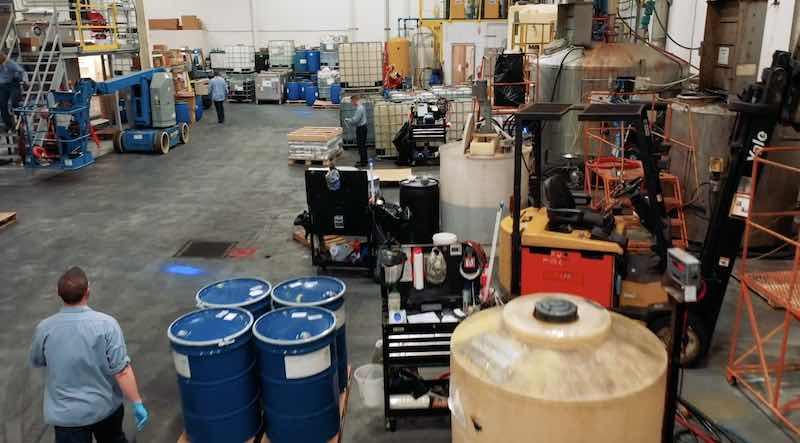 Columbia Chemical logs an order from the time it comes in and tracks it to get it out within three days, and most of the time it ships out within two. Larick adds that customers need choices, and OEMs and Tier suppliers are no exception. He says that industry consolidation has eliminated a choice for OEMs and Tier suppliers in terms of alternative chemistry suppliers, creating a stronghold that negatively impacts plating shops.
Columbia Chemical logs an order from the time it comes in and tracks it to get it out within three days, and most of the time it ships out within two. Larick adds that customers need choices, and OEMs and Tier suppliers are no exception. He says that industry consolidation has eliminated a choice for OEMs and Tier suppliers in terms of alternative chemistry suppliers, creating a stronghold that negatively impacts plating shops.
“This is just starting to let up as new chemistry approvals are being qualified and customers are realizing they have a choice,” he says. “Competition is healthy. It drives awareness, quality, innovation, service, and enhances efficiency. Recent industry acquisitions and consolidations have begun to drain innovation. And we have not only seen it at the supplier end, but we have also seen it in the field with plating shops.”
Larick says that in the last few years, he has been encouraged to see several young people get involved and stay in the industry, both at the supplier and plating shop levels.
“I would agree that in past years, the industry has experienced a technical brain drain, but I am seeing a light at the end of the tunnel,” he says. “This industry attracts and captures a certain type of individual – one that is inquisitive, solution-driven, does not like routine, and instead thrives on different challenges each day.”
“We deliver Nordstrom-level service with Kirkland-tier value,” Crowder says. “When others consolidate, we innovate. That’s our difference.”
Larick says there appears to be more of that entering the workforce.
“We need to continue to train and nurture this pipeline of young talent,” he says. “The industry needs to adopt a commitment to establish training and succession planning to secure and maintain a technical knowledge base for future generations.”
At Total Finishing Solutions, Crowder says that consolidation might be reducing competition, but they have become the disruptors.
“We’re the brand, not just a reseller,” he says. “Our business model is B2B by design, cutting out the middleman to offer high-performance finishing solutions at real-world prices. We deliver Nordstrom-level service with Kirkland-tier value. When others consolidate, we innovate. That’s our difference.”
Shop Consolidation Continues, Too
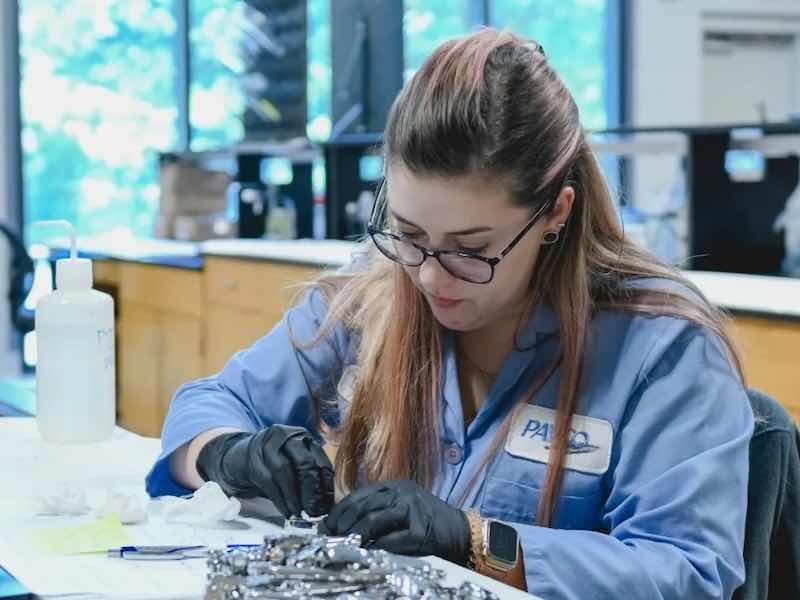 Pavco says its metal finishing expertise is grounded in more than seven decades of service to the industry, including extensive laboratory facilities.Miles says that as he works with more suppliers to obtain chemicals and equipment for finishers and coaters, he hopes the issue of consolidation will smooth out over the coming years, as shops try different suppliers if they aren’t happy with their current ones.
Pavco says its metal finishing expertise is grounded in more than seven decades of service to the industry, including extensive laboratory facilities.Miles says that as he works with more suppliers to obtain chemicals and equipment for finishers and coaters, he hopes the issue of consolidation will smooth out over the coming years, as shops try different suppliers if they aren’t happy with their current ones.
He also notes that when shops start consolidating, it becomes a problem on the supplier side as well.
“This is a classic chicken and egg problem,” Miles says. “From the supplier’s side, the same question is being asked of end-user consolidation or relocation impact on their business. It could be as a result of some big checks being written to acquire, or a lack of a succession plan, or lower costs of doing business in other geographies.”
Miles says it would also be a benefit for the prime contractors to qualify new suppliers, especially where consolidation has reduced choices and competition.
“We are seeing some of this take place,” he says. “We have seen and read about the next generation purchasing shops, the primes opening up approvals, and some sharp personnel in facilities that like what they are doing.”
Adding Analytical and Material Science Equipment
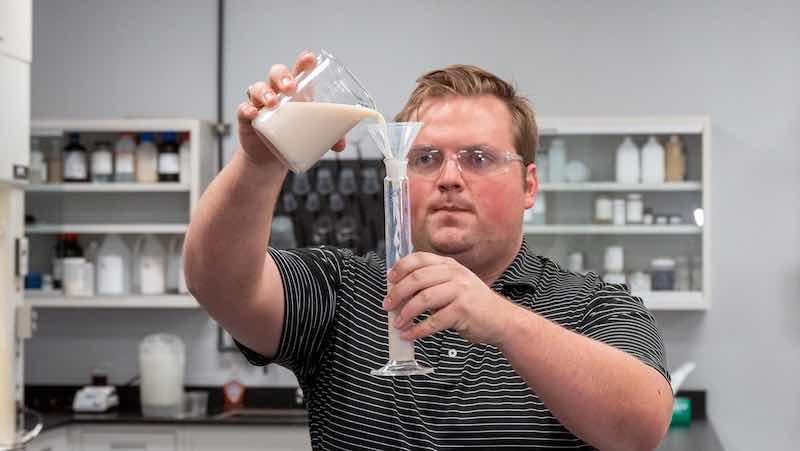 Hubbard-Hall is exploring remote monitoring with IoT sensors that tell them a shop’s bath condition, pH, temp, etc., so they can flag issues early. For companies like Pavco, the focus will be on what has made them a leading independent supplier of chemistry over the last few decades: innovation and reinvestment.
Hubbard-Hall is exploring remote monitoring with IoT sensors that tell them a shop’s bath condition, pH, temp, etc., so they can flag issues early. For companies like Pavco, the focus will be on what has made them a leading independent supplier of chemistry over the last few decades: innovation and reinvestment.
“Our largest capital investments over the past 10 years have been in analytical and material science equipment that helps our labs provide top-notch routine and troubleshooting analysis,” Majoy says. “Some of these investments have been in microscopy — both SEM and metallurgical microscope — and upgrading our torque tension equipment, and adding additional analytical equipment like HPLCs and Total Organic Carbon.”
He says a primary example of the quality and responsiveness of their service is lab turnaround time, which serves as a key performance indicator for the department. He says that given the dynamic nature of customer planning solutions, timely and accurate analytical results are critical.
“Our departmental goal is to complete and report 95% of sample analyses within 48 hours of receipt,” Majoy says. “Over the past three years, we have consistently exceeded this target, averaging a 98.5% on-time turnaround rate each month.”
Larick adds that, when consolidation occurs, the focus of big companies often comes down to numbers. However, he notes that the finishing industry was founded by smaller, hardworking companies, many of which are family-owned, and that’s why relationships matter.
“At the end of the day, the difference is in the people and the level of service delivered,” Larick says. “Being a 100% employee-owned business sets us apart in terms of a customer and service-oriented mindset, and employee engagement and retention. It allows our employees to easily connect what they are doing to the value provided to our customers every day.”
Hubbard-Hall’s Papst says that shops should stop thinking of suppliers as interchangeable.
“If support matters to you, bake it into your buying criteria,” he says. “Don’t just price shop and then expect Michelin-star service. The best relationships we have are with customers who see us as partners. They involve us early, value our input, and get better results. That’s what the modern supply relationship should look like.”
Visit www.chemeon.com, www.columbiachemical.com, www.hubbardhall.com, www.mileschemical.com, www.pavco.com, and www.totalfinishingsolutions.com.






